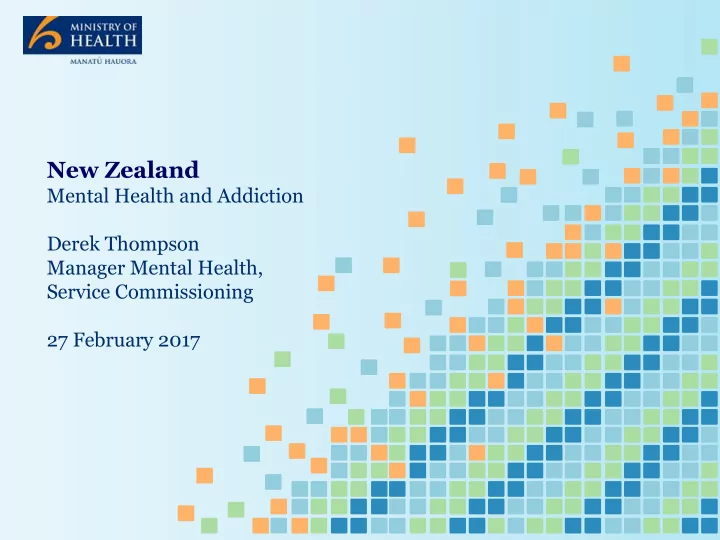

New Zealand Mental Health and Addiction Derek Thompson Manager Mental Health, Service Commissioning 27 February 2017
Wellington NZ 2
3
Vote Health • Approximately NZ$16Billion per annum total Vote • Mental health spend approx. NZ$1.4 Billion • 20 DHBs Private and NGO providers 4
New Zealand Health Strategy 5
New Zealand Health Strategy Health links with the wider environment 6
Strategic Planning • NZ Health Strategy released April 2016 • Revised Gambling Harm Minimisation Strategy 2016/17 to 2018/19 • National drug Policy 2015 to 2020 • Substance Abuse Compulsory Assessment and Treatment Act 2017 • Health of Older Peoples Strategy in development • New Mental Health and Addiction Strategy in development • New Suicide Prevention Strategy in development • Social Investment approach at a whole of government level - Health working inter-sectorial with other social sectors to improve outcomes ( mental health and addiction interface with Corrections, Police, Justice, Education, Social Development ) • Social Investment Unit mental health test case in development 7
Moving to a population outcomes approach • Mental Health and Addictions Commissioning framework published August 2016 • Developing a Mental Health and Addiction Population Outcomes Framework (He Tangata) • Rural mental health framework in development • National Youth Forensics Unit opened April 2016 • Youth Mental Health Programmes – Evaluation report published December 2016 • Anti-discrimination stigma campaign – Like Minds Like Mine. 8
An Integration focus • Pharmacy Action Plan 2016-2020 published June 2016 – opportunities for the role of Pharmacists to manage and support mental illness in the community. • Improving primary and community mental health - National telehealth services e.g. expert advice line in development. • Supporting Parents Healthy Children Guidelines published published 29 September 2015 9
E- therapy Online help • SPARX an online fantasy game for youth which delivers cognitive behavioural therapy disguised as a computer game • National Depression Initiative programme - The Journal and online programme that coaches people through lessons on improved nutrition, exercise, better sleep, positivity and structured problem solving therapy • The SPGETTI (Smartphone-based Problem Gambling Evaluation and Technology Testing Initiative) study, developed and tested a novel smartphone application (“app”) to see if it was a feasible way to provide additional support to people with gambling problems associated with pokies. 10
Rising to the Challenge: the Mental Health and Addiction Service development Plan 2012 to 2017 ‘ All New Zealanders will have the tools to weather adversity, actively support each other’s wellbeing, and attain their potential within their family and whānau and communities .’ Rising to the Challenge aims to improve outcomes for people who use primary and/or specialist mental health and addiction services, including their families and whânau. The 100 actions are grouped into four goal areas: • A ctively use our current resources more effectively • B uilding infrastructure between primary and specialist services • C ementing and building on gains in resilience and recovery • D elivering increased access. 11
New Zealand Suicide Prevention Strategy 2006 – 2016 • Its overarching aim is to reduce the rate of suicidal behaviour and its effects on the lives of New Zealanders, while taking into account that suicide affects certain groups more than others. • The strategy has 7 goals. • Promote mental health and well-being, and prevent mental health problems. • Improve the care of people who are experiencing mental disorders associated with suicidal behaviour. • Improve the care of people who make non-fatal suicide attempts. • Reduce access to the means of suicide. • Promote the safe reporting and portrayal of suicidal behaviour by the media. • Support families/ whānau , friends and others affected by a suicide or suicide attempt. • Expand the evidence about the rates, causes and effective interventions. 12
National Drug Policy 2015-2020 Key goal : to minimise harm from alcohol and drug use, and promote and protect health and wellbeing. It does this through a balance of measures that: • reduce harm that is already occurring (problem limitation). • reduce the desire to use alcohol and other drugs (demand reduction) • prevent or reduce the availability of alcohol and other drugs (supply control) Drug policy is a complex area that requires input and participation from a wide range of government and non-government agencies, including the Ministry of Health. The National Drug Policy 2015-2020 has a focus on collaboration and emphasises that everyone can have a role in reducing harm from alcohol and other drugs. 13
Challenges In 2015, a record number of people accessed specialist mental health and addiction services. This increase is consistent with international trends, and has occurred in the context of population growth. This is placing pressure not just on the health system, but across the social sector. 3% 3.7% 17% 80% 14
System level change • A system that knows when to : • Watch • Walk along side • Hold hands • and Hug He aha te mea nui o te ao ? He Tangata, He Tangata, He Tangata 15
Thank you 16
Recommend
More recommend